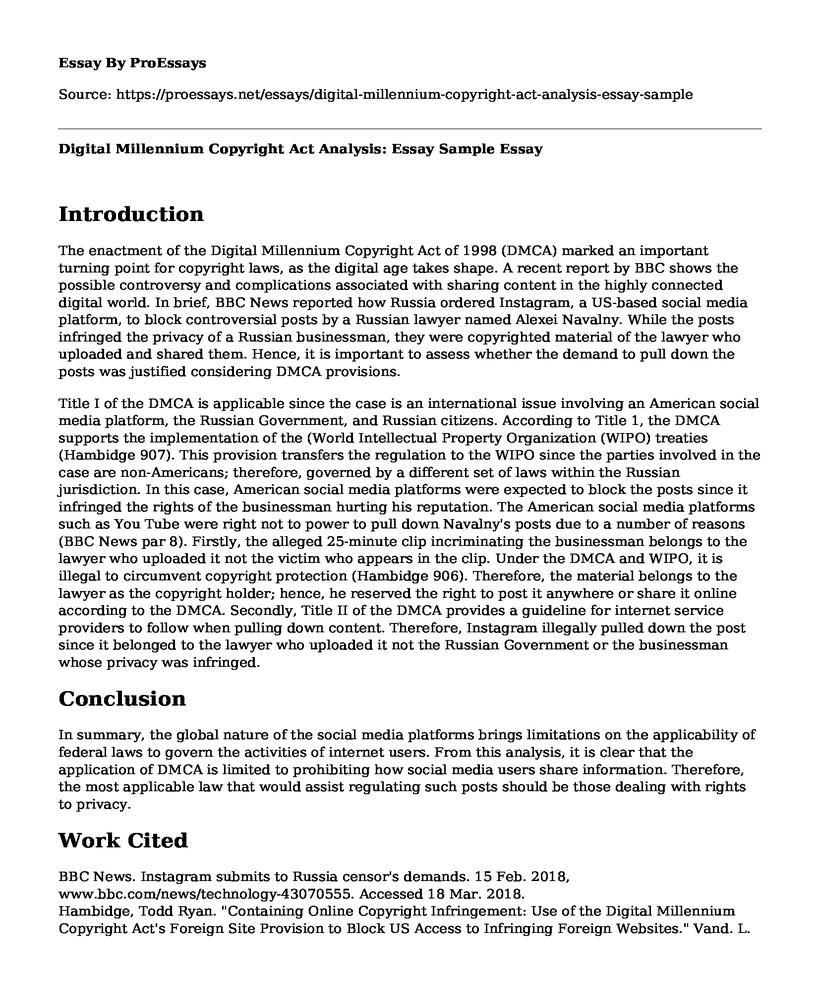Introduction
The enactment of the Digital Millennium Copyright Act of 1998 (DMCA) marked an important turning point for copyright laws, as the digital age takes shape. A recent report by BBC shows the possible controversy and complications associated with sharing content in the highly connected digital world. In brief, BBC News reported how Russia ordered Instagram, a US-based social media platform, to block controversial posts by a Russian lawyer named Alexei Navalny. While the posts infringed the privacy of a Russian businessman, they were copyrighted material of the lawyer who uploaded and shared them. Hence, it is important to assess whether the demand to pull down the posts was justified considering DMCA provisions.
Title I of the DMCA is applicable since the case is an international issue involving an American social media platform, the Russian Government, and Russian citizens. According to Title 1, the DMCA supports the implementation of the (World Intellectual Property Organization (WIPO) treaties (Hambidge 907). This provision transfers the regulation to the WIPO since the parties involved in the case are non-Americans; therefore, governed by a different set of laws within the Russian jurisdiction. In this case, American social media platforms were expected to block the posts since it infringed the rights of the businessman hurting his reputation. The American social media platforms such as You Tube were right not to power to pull down Navalny's posts due to a number of reasons (BBC News par 8). Firstly, the alleged 25-minute clip incriminating the businessman belongs to the lawyer who uploaded it not the victim who appears in the clip. Under the DMCA and WIPO, it is illegal to circumvent copyright protection (Hambidge 906). Therefore, the material belongs to the lawyer as the copyright holder; hence, he reserved the right to post it anywhere or share it online according to the DMCA. Secondly, Title II of the DMCA provides a guideline for internet service providers to follow when pulling down content. Therefore, Instagram illegally pulled down the post since it belonged to the lawyer who uploaded it not the Russian Government or the businessman whose privacy was infringed.
Conclusion
In summary, the global nature of the social media platforms brings limitations on the applicability of federal laws to govern the activities of internet users. From this analysis, it is clear that the application of DMCA is limited to prohibiting how social media users share information. Therefore, the most applicable law that would assist regulating such posts should be those dealing with rights to privacy.
Work Cited
BBC News. Instagram submits to Russia censor's demands. 15 Feb. 2018, www.bbc.com/news/technology-43070555. Accessed 18 Mar. 2018.
Hambidge, Todd Ryan. "Containing Online Copyright Infringement: Use of the Digital Millennium Copyright Act's Foreign Site Provision to Block US Access to Infringing Foreign Websites." Vand. L. Rev. 60 (2007): 905.
Cite this page
Digital Millennium Copyright Act Analysis: Essay Sample. (2022, Apr 04). Retrieved from https://proessays.net/essays/digital-millennium-copyright-act-analysis-essay-sample
If you are the original author of this essay and no longer wish to have it published on the ProEssays website, please click below to request its removal:
- Film Analysis Essay on Water by Deepa Mehta About a Little Indian Widow
- Movie Analysis Essay on Life of Pi: A Journey of Belief, Discovery and Devotion
- Cinema Paradiso - Movie Analysis Essay
- Essay Example on Modern Store Architecture: Drawing Shoppers In
- Paper Example on Huawei's Innovative Health & Fitness App: A Comprehensive Review
- Fashion Companies Lack Clear Ethical Standards: What Does Sustainability Mean? - Essay Sample
- Impacts of Emerging Technologies - Report Sample







